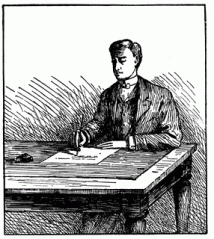 Figuring out the names of one’s character or one’s book makes most writers feel–at one point or another–more than a little stalled out… for lack of a better phrase.
Figuring out the names of one’s character or one’s book makes most writers feel–at one point or another–more than a little stalled out… for lack of a better phrase.
“Don’t worry about the name of your character,” one of my English teachers would say, whilst striding down an aisle of desks, hands clasped behind her back. “Call him John Smith or Buffo Neilsen… but just get the story written. A rose by any other name would smell as sweet…”
I spent the rest of the allotted “brainstorming” time that day wondering how sweet a rose would smell if its name was “cactus”… or “dunghill.” It just didn’t sound right, I thought. Shortly thereafter I realized the inherent importance of hitting upon the right name… the sound.
Most folks agree that sounds at least ‘helps’ with defining who we are. Music moves the human soul, eases the inward desire to speak, hear and be heard. Poets sometimes agonize over a single syllable in their prose, illustrating another aspect of sound: its ability to instantly express the differences between one human and the next. Thus, a hearing/speaking fiction writer feels at a loss if said figure in their head has no name bestowed upon them… their very own audible, spoken, readable identifier.
Certainly one can–conceivably–write about _________ (heroine of the book) day after day with a measure of success. It is possible. However, many writers feel as I do, that a person’s name helps shape their character and often can even influence one’s decisions. A character named Cecile, for instance, may turn out very different than an identical-looking one called Griselda, or worse…
Most kindergarten-age children are well aware that one’s name can be a source of endless amusement for their fellow schoolyard inhabitants and can alter their experience of education altogether. A pretty girl named Snot—for example–would likely find very little solace in her looks; she’d be railed upon—unfairly–by her peers, never allowed to be at ease, and probably grow to either hate her fellow human—including the strange people that named her–or grow more mired in misery and depression until she reached the legal age to change it to something less “gross.” Snickers would invariably ensue each time poor Snot appeared, and would maybe keep her from focusing on her studies provoking an incorrect diagnosis of “ADD” or “dyslexic,” leading to even more ridicule.
The names of your book characters notwithstanding, coming up with the piece’s title has caused many a writer grief and elation… often within the same minute. Certainly the piece can be written without it, but you are not alone if you’ve agonized over the title of your book much the same way as a poet has walked in circles–gripping their leaking pen–searching for that exact word that pinpoints the emotion they feel, barking at anyone that dares interrupt with such petty matters as food or water. If the title is not “right”–if it fits not the piece for which it is intended–many writers feel they cannot continue until it is figured out, to the utter amusement of their non-writing compatriots.
“Come on… it’s just a title,” a relative/friend/co-worker might say. “What’s the big deal?” The inquirer is–more often than not—mystified by the cold glare directed their way upon uttering the the above sentence, or something like it, which is the milder of the possible replies in a writer’s arsenal (just behind the sharp retort of “Asking that question merely proves your inability to comprehend the answer.”) {writer stalks off stage left}
Would you want to smell a dunghill? No. But a rose… why, yes, you probably would. Maybe you wouldn’t read a book called The Vertically-Challenged Initially Mediocre Fictional Being… but you might just read The Hobbit. Names and titles do matter; perhaps not as much as plot, nor the proper use and placement of adjectives–and their verb counterparts–but labels are pivotal to a writer’s human characters, as well as the title of the piece they have worked so very hard on.
So, bear in mind these rather biased notions from a fiction writer before giving the prose-creator you know a hard time as they stand out on the roof of their apartment building in the rain, grimacing at the parapet wall–mumbling to themselves—inwardly weighing “Drakyr” verses “Gnylor” as the label by which the epic villain in his mind is known and feared. Yelling out “just pick one already” may not deprive the literary realm of a proper foe, but it just might induce the rather damp and irritated writer to turn around and consider your name–not as the strong hero–nor the feared villain, but for the deformed and hated minion everyone kicks to make themselves feel better…
L. R. Styles is a writer for Belator Books
